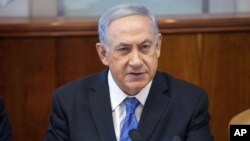Israel warned on Sunday it would not accept any long-term truce deal that did not meet its security needs as Gaza cease-fire talks resumed in Cairo.
Israeli Prime Minister Benjamin Netanyahu, speaking before Israel's weekly Cabinet meeting on Sunday, said that Hamas had suffered a huge setback in the four-week war and that would be reflected at the Cairo talks.
"If Hamas thinks that by continuing the sporadic shootings (of rockets at Israel) it will make us agree to concessions, it is mistaken," Netanyahu said.
The negotiations between Israel and Hamas have been going on since early last week.
The aim is to broker a long-term arrangement to halt over a month of bloody fighting, which erupted on July 8 and has so far claimed 1,980 Palestinians lives and 67 on the Israeli side.
Threat of renewed fighting
Netanyahu also said he was undeterred by Hamas' warnings of renewed fighting in the Gaza war, pledging Israel would hold fast to its security needs in indirect talks with the Palestinians in Cairo.
Netanyahu promised “harsh strikes” if Hamas fighters renewed their attacks on Israel.
“The Israeli delegation to Cairo from the first day, is working under very clear instructions: To stand steadfast on Israel's security needs. Only if there will be a clear solution for our security needs, only then will we be prepared to come to understandings,” Netanyahu said.
“If Hamas thinks that it can compensate for its military defeat with diplomatic gains, it is mistaken. If Hamas thinks that through continued intermittent firing it will cause us to make concessions, it is mistaken," he added.
Commenting on Netanyahu's remarks, Hamas spokesman Sami Abu Zuhri said: “The only way to achieve security is to afford security to the Palestinians first and to lift the blockade and to agree to their demands.”
Hamas rejected on Saturday as insufficient offers made in Cairo to Palestinian negotiators seeking to end Israel's offensive in the Gaza Strip, and raised the possibility of renewed fighting when the current truce expires at midnight (2100 GMT) Monday.
Hamas, Gaza's dominant Islamist group, wants an eight-year-old Israeli-Egyptian blockade on the coastal enclave lifted, as well as the establishment of a seaport and airport, as part of any enduring cessation of hostilities with the Jewish state.
Palestinian lawmaker Mustafa Barghouti said, "The Palestinian side still demands a real lifting of the siege.
"What is proposed is not enough yet, what we need is a complete elimination of the siege and this can only be achieved if there is an independent port and an independent passage internationally protected and internationally guaranteed that Israel can not interfere with," Barghouti said.
Talks in Egypt
The talks began Sunday afternoon at the headquarters of the Egyptian intelligence in the absence of four officials from Gaza, among them representatives of Hamas and Islamic Jihad, who were expected to arrive during the evening.
It was the first time they had sat down since Wednesday after the negotiators returned home for three-days of consultations with their respective political masters.
Both sides say gaps remain in reaching a long-term deal that would keep the peace between Israel and militant groups in Gaza, and open the way for reconstruction aid to reach the battered enclave.
Israel wants the disarmament of Hamas in the territory of 1.8 million people.
The Palestinian demand for a Gaza seaport and reconstruction of an airport destroyed in previous conflicts with Israel has been a stumbling block, with Israel citing security reasons for opposing their operation.
“The demilitarization of Gaza which was already guaranteed in the Oslo agreement, that there will be no rocket no missile whatsoever in Gaza, should be on the table again. Otherwise a seaport or an airport without commitment for demilitarization is like a duty free for rockets and missiles,” said Yuval Steinitz, Israeli intelligence and strategic affairs minister.
Some conditions met
Israel said it is willing to ease the blockade but not lift it completely, fearing that Gaza could be flooded with weapons. Hamas, on the other hand, said it will never agree to Israel’s demand to give up the armed struggle.
Therefore, Egypt is pushing for an open-ended cease-fire, to give negotiators more time to hammer out a long-term agreement.
Israeli Communications Minister Gilad Erdan, a member of Netanyahu's security cabinet, said Israel was examining the Egyptian proposal as a whole and had yet to make any final decision.
The Gaza offensive has had broad public support in Israel, where militants' rockets, many of them intercepted by the Iron Dome anti-missile system, have disrupted everyday life but caused little damage and few casualties.
Robert Berger contributed to this report from Jerusalem. Some information for this report provided by Reuters, AFP and AP.





